#in's and out's event
Text

₊˚⊹。 here’s to hoping (cause i can’t stop calling) | gojo satoru

wc: 1.1k
summary: gojo calls, and you spend it half-wishing you weren’t broken up.
contains: gn!reader, exes to ???, alcohol, mentions of going to the club, gojo is bad at being an ex, complicated feelings, ambiguous ending, kind of hurt/comfort.
a/n: writing this as my copium, i haven’t written gojo outside of col in so long so this was challenging, but equally as exciting! some songs that inspired this are: better than this - lauv & oh, gemini - role model.
part of the in's and out's new year/birthday event | request
prompt: calling your ex drunk at two a.m. with feelings still stuck in your throat

“Well, well, well… miss me already?”
The clock on your kitchen wall reads some time between 2:05 and 2:10. Even when you squint, the little lines remain a drunken blur.
You blame it on the alcohol.
“Don’t be shy now.” the voice on your phone continues, shaking you out of focus.
Had you been any more sober, you wouldn’t be in this situation right now.
Had you been any more sober, the throbbing in your head wouldn’t have persisted from the sound of—
“Gojo–” you sigh.
“Satoru.” he interrupts, a full pause before he continues, softer, “It’s Satoru, remember?”
Had you been any more sober, you wouldn’t have even answered his call.
You haul your bag up sluggishly, the chains of the strap clacking against your countertop. Patience is a ticking time bomb when you’re this inebriated, the heavy bass from earlier tonight still thumping its way within your brain.
You can’t think straight.
“Satoru,” a name now foreign but still so close to home; it burns on your tongue, trickles bittersweet down your throat, “you called. What do you need?”
It’s stupid of you to ask, you know, because Gojo’s been calling you like this since the day you broke up months ago. You’d picked up the first few times, but quickly realized that it wasn’t good for the both of you—you’d never move on, and Gojo would never let you go.
Except—
“You picked up.”
—liquor makes for poor company when it only serves to soften the anger you’ve built up as protection. It really is all the alcohol’s fault.
Your eyes burn as you squeeze them shut, sighing, a twisted exhale, “You have to stop, Satoru.”
“Stop what?” he feigns, the lilt at the end a sure sign of the most insufferable smirk.
The thought of it makes you sick, makes you ache with memories of pinching his nose at the sight of it. He used to giggle then; now, he chuckles on the other end.
That’s the question, isn’t it? Stop what?
Since the break-up, Gojo’s been acting like nothing’s changed. He still calls you just as much, still texts you with undertones that tread the fine line between flirty and ‘just Gojo’. Your toiletries are still at his apartment, and his clothes are still in your closet.
You’d find humor in it if not for the fact that all of it has been so goddamn confusing.
He started it; he broke up with you.
Shouldn’t he be pushing you away?
To this day, you have no full closure, no other reason other than an ‘it’s better this way’ followed by a continuous stream of mixed signals because how he treats you is still the same.
“Stop calling,” a lump forms in your throat, an admission you’ve had to remind yourself again and again, “we’re not together anymore.”
“I can’t call a friend?”
You snort, fiddling with the metal links of your bag strap, “Is that what we are?”
A pause. Slippers shifting on floorboards. They sound just like the sleepless nights he’d shuffle out of bed.
You can picture him on the other end, head tilted and leant back on the plush leather of his couch. He hums but doesn’t answer you—he never does when it can mean something.
“You still sound the same.”
And you don’t expect it at this moment, to get so choked up over how he sounds over radio waves, but he says the words a little too fondly for you not to notice. Gojo’s always teased that he can pinpoint your voice from the moment you speak the first word.
You don’t mean to give him any more authority over your feelings than he already has, but the words slip out before you can catch yourself, “You’re being unfair.”
Another hum. His tone shifts to something lighter, more teasing, “Like you aren’t. Always typing, never sending…”
The huff that punctuates his sentences paints itself vividly with a small pout.
“Stop staring at my chat box then.” is all you can muster, the ache spreading throughout your chest.
“Afraid I can’t.”
You don’t know whether to laugh or cry.
“You’re impossible.” your eyes begin to feel wet, your sniffle concealing itself as you clear your throat.
The silence that follows is uncharacteristic of your relationship with Gojo, even more of the man you know, but you find it filled to the brim with all the possibilities of what went wrong—of things you know he’ll never say out loud.
You know Gojo has issues; they presented themselves well enough in the year you were together. Being with him is accepting that you’ll be reading between the lines your entire life.
He is simultaneously touchy but distant, vocal but elusive in his affections; he drapes himself over you every chance he gets, but when you touch him in places no one else has, you think a storm swirls cyan in his irises. Gojo gives compliments like candies on Halloween, but he keeps his feelings close to his chest, locked away like presents tightly wrapped under a Christmas tree.
This is why you never saw it coming.
This is why there was no hint, no sign of him ever wanting to break things off when he did.
‘Let’s stop dating’ with no warning.
“Had fun tonight?” he asks so casually, like it doesn’t tell you a million things—how he still has your location on his phone, how he’s still checking on you, Six Eyes or not.
Tonight was okay, all things considered. You don’t go to clubs often, but your friends kept you company; the music boomed just a tad bit louder than you’re used to, and the drinks were good, but—
“You would have hated it.”
If Gojo were there, you would have stayed 10 minutes tops. He’d whine about being bored but you’d be able to tell, from the slight furrow of his brows and the clenching of his jaw that it’s because one of his migraines is forming.
“Good thing I’d have you, then.”
There are half-truths in jokes like this, a dangerous thing to say when you both know he could still have you if he wanted.
“Stop flirting, it’s annoying.” you try to steel your voice, pushing down the false hope rising in your chest.
“You love it, though.”
The pain sears you, hurts when he says the word so lightly, as if he isn’t aware that you know love is the reason he had to break things off prematurely. As if he doesn’t know that you’re still in love with him, that you’re still putting faith in a tragedy.
“Do you even know what loving something feels like?”
The line remains silent, save for the softest sound of his breath hitching.
You must have hit a nerve.
He hums, an expected answer, but then he mumbles, words spoken so faintly, so quietly, you’re surprised they even came through.
“Yeah, I do.”

a/n: wanted to use this as dialogue practice because i think gojo’s dialogue is one of the trickiest to nail! i also found it so fun exploring this kind of dynamic with him!! i subtly hint on some of gojo’s personal issues but don’t explicitly state it to leave room for interpretation! the ending is ambiguous for that same reason.
thank you notes: @stellamancer for helping me out so much with this 🥺 practically beta-ing it, really 🥺 ily niku 🥺 in my head, gojo does not exist without you 🥺 & @twentyfivemiceinatrenchcoat @scarabrat @soumies for being my lil cheerleaders always 🥺 ily all 🥺

comments, tags, and reblogs are greatly appreciated ♡
#gojo satoru x reader#gojo x reader#satoru x reader#jjk x reader#gojo fluff#satoru gojo x reader#jujutsu kaisen x reader#jjk#satoru#gojo x you#gojo x yn#gojo x y/n#jjk x you#jjk x yn#jjk x y/n#shotorus.writes#shotorus.events#in's and out's event
421 notes
·
View notes
Text
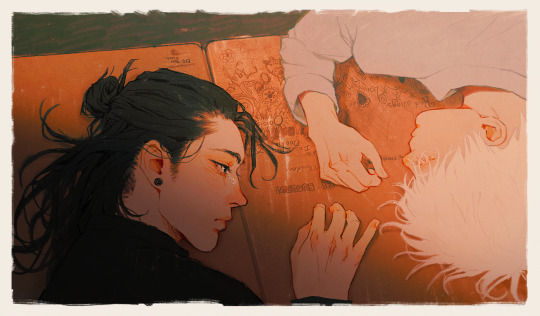
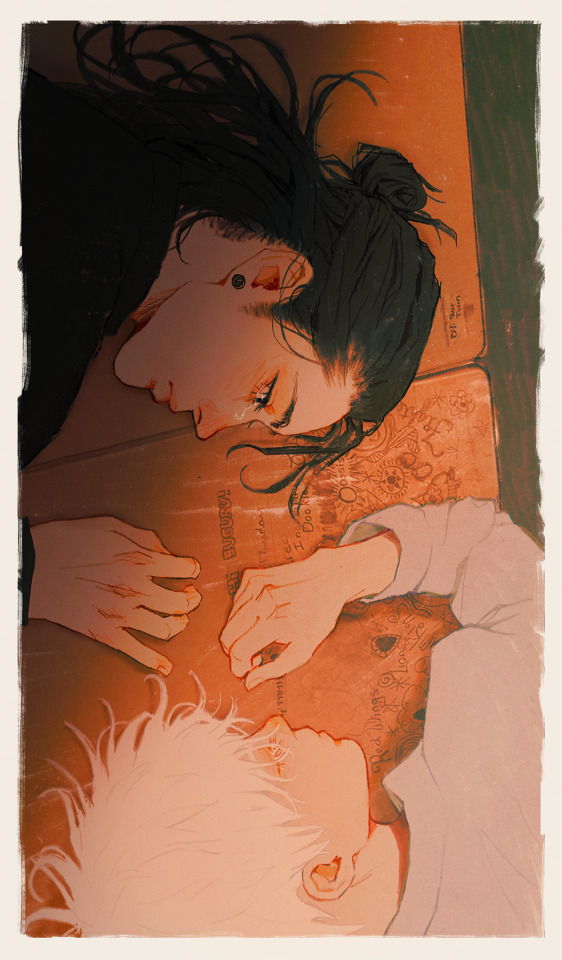
a moment of peace before the whole world shatters 😇
get your own print here ❤️
#do you ever cry while touching your pinky to a strand of your besties unruly hair#I call this aesthetic “warm angst” :'D#geto taking the pining to the next level#I imagine this takes place after the big village event#but before gojo finds out about it#just geto taking a moment to say his farewell to the life as he knew it#christmas present for my satosugu obsessed buddy @kymsys who lovingly made me read the manga at gunpoint. I hate you (affectionately) ❤️#jujutsu kaisen#jjk#satosugu#stsg#satosugu fanart#stsg fanart#gojo satoru#geto suguru#jjk fanart#anime#fanart#digital art#art#artwork#gojo fanart#geto fanart
32K notes
·
View notes
Text
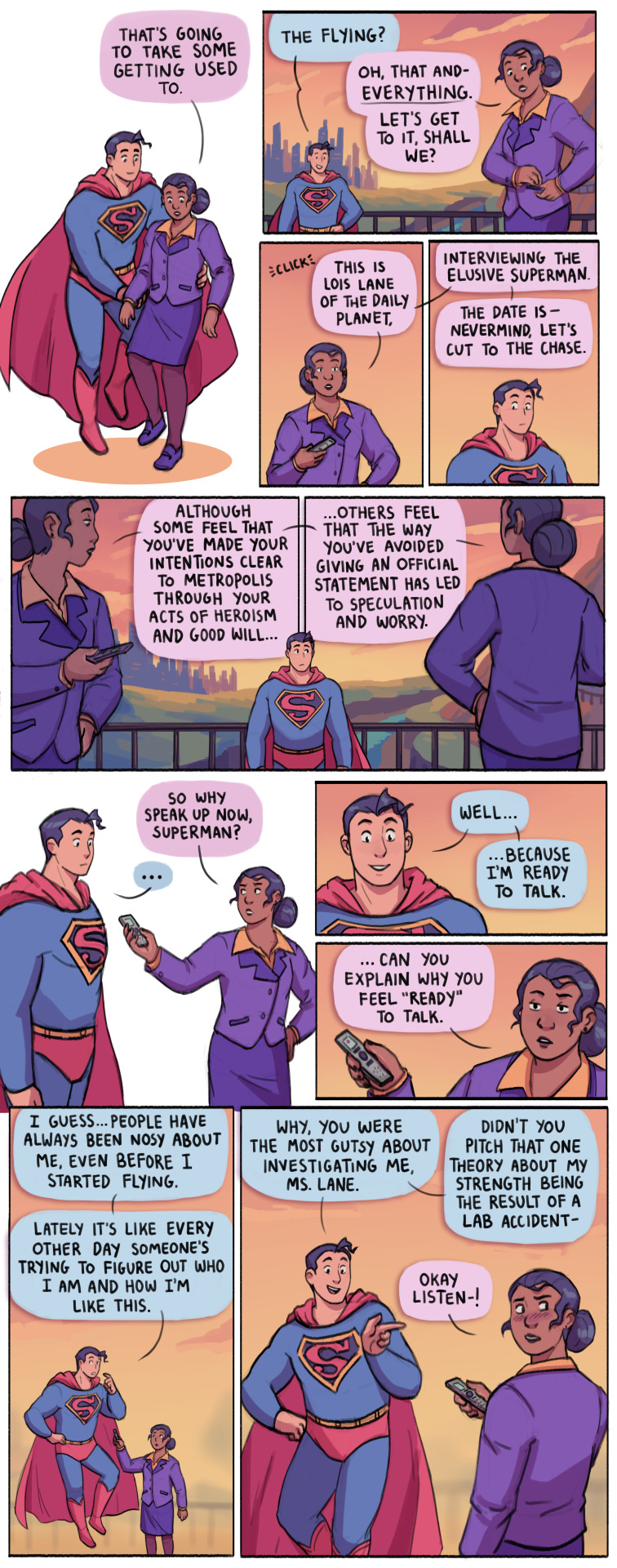
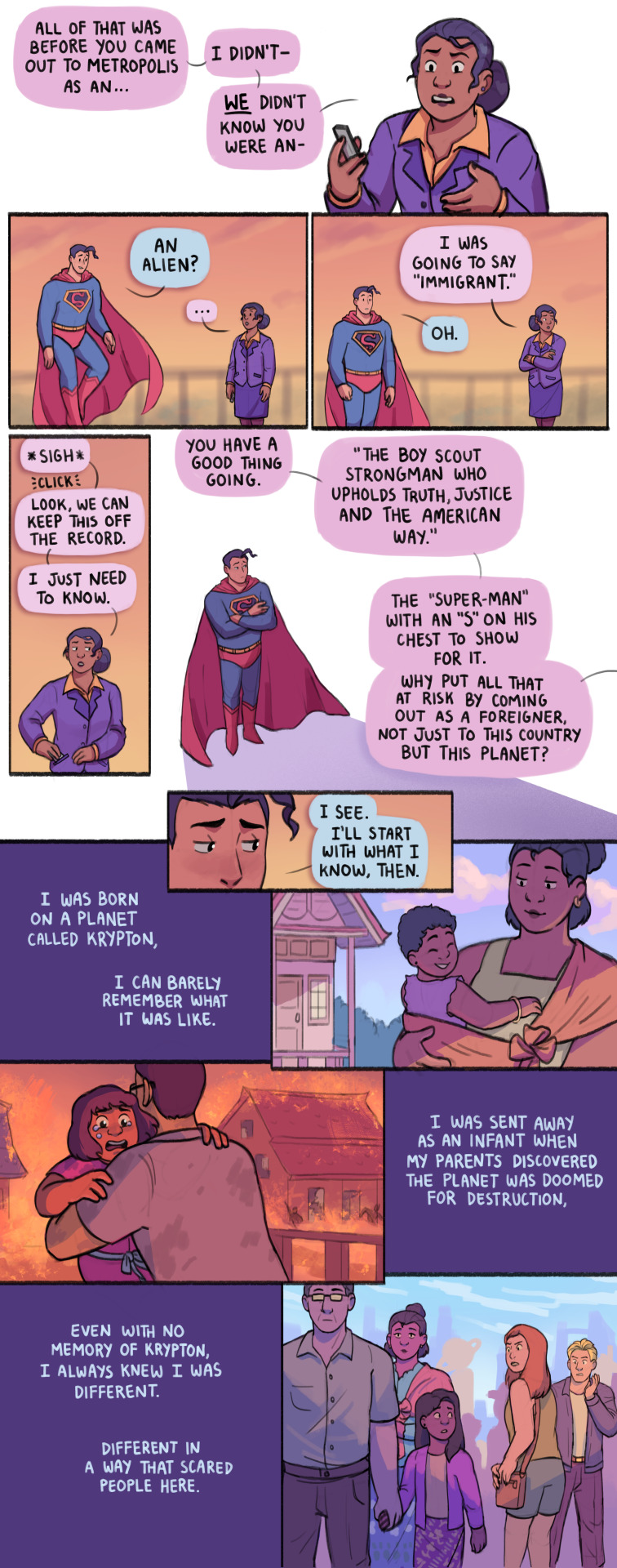

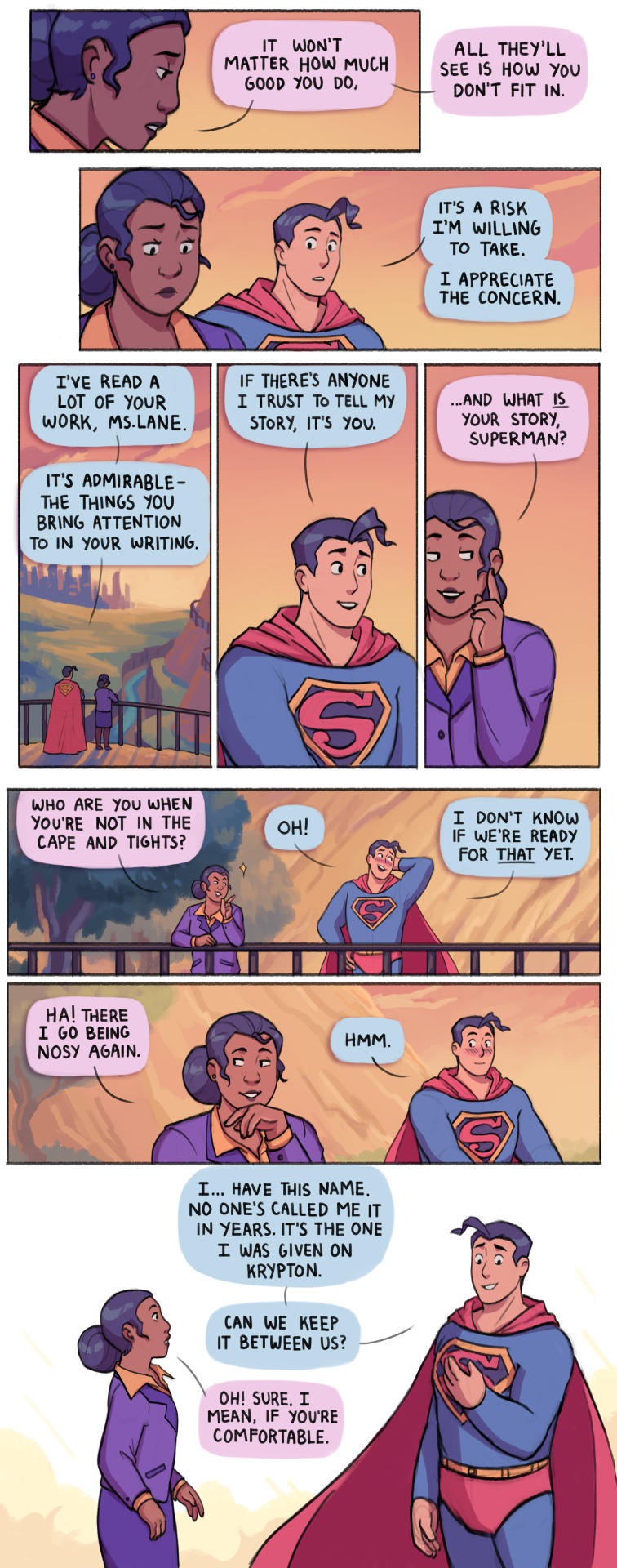
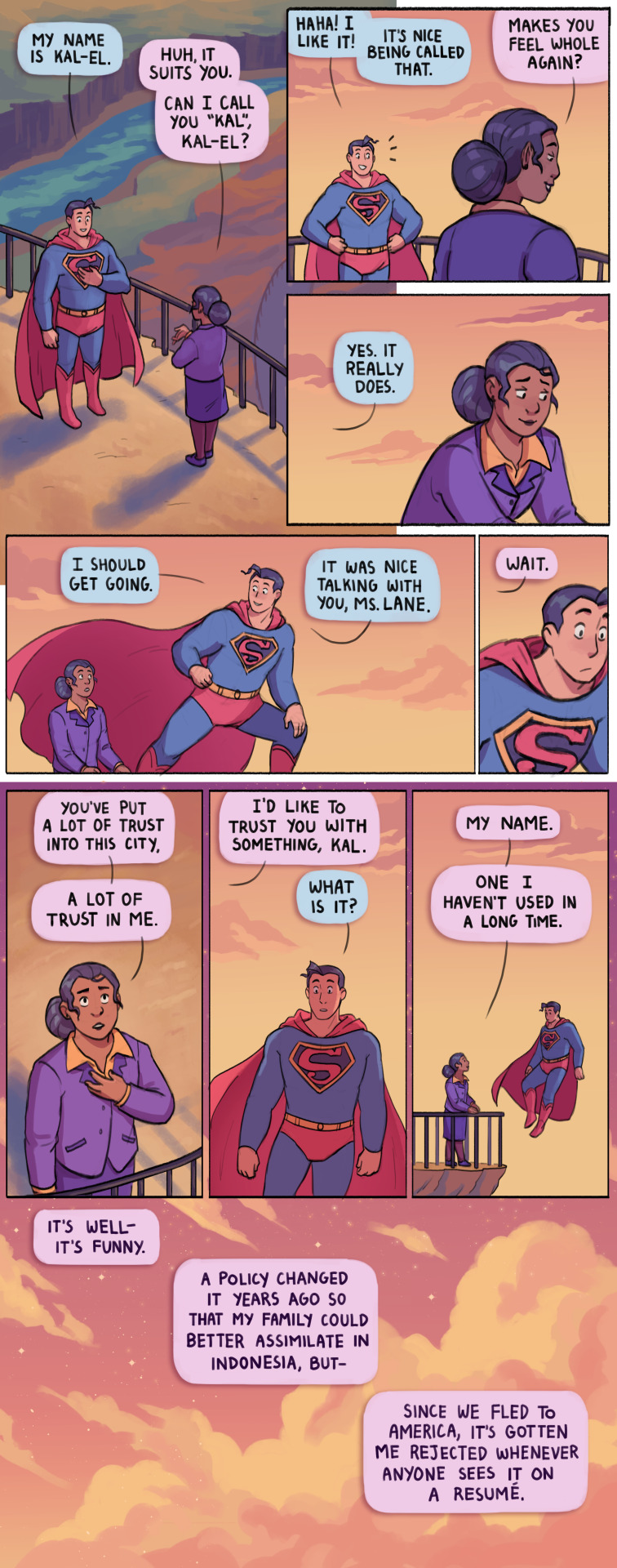
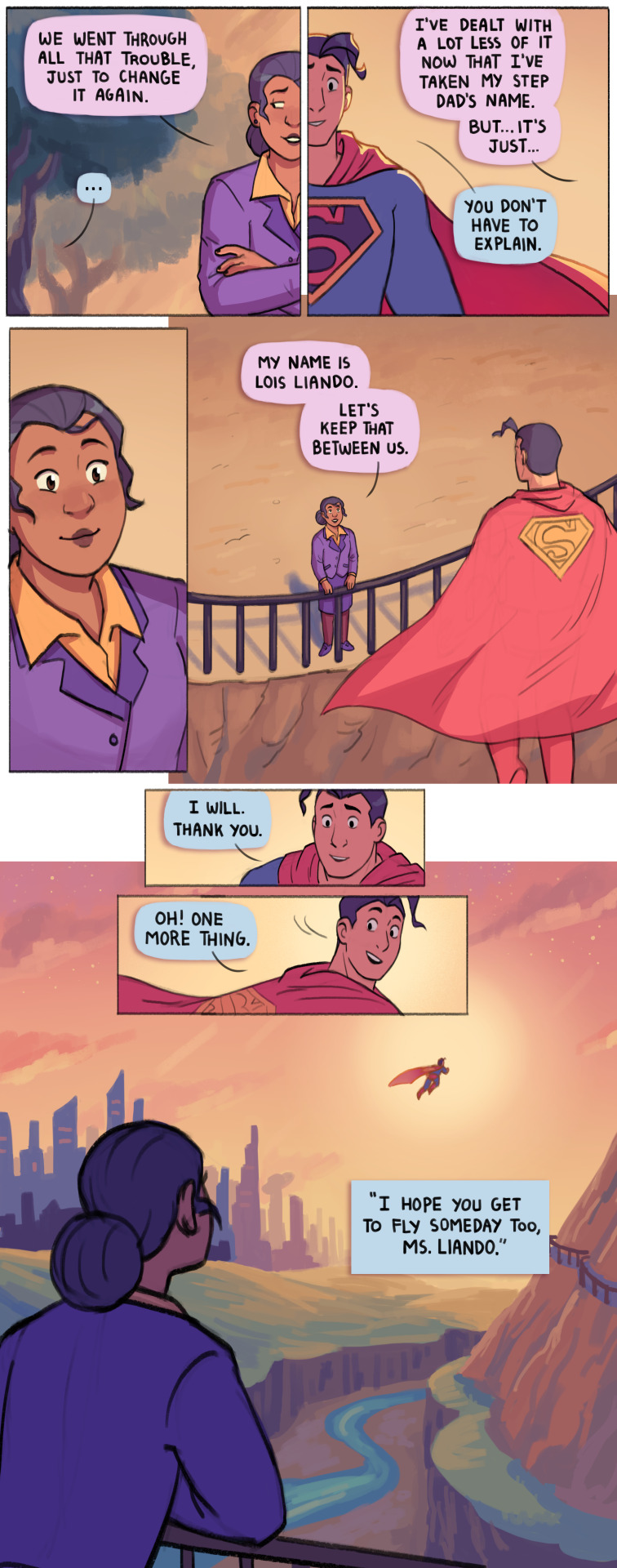
"Who Is Superman? A Private Interview with Lois Lane" a fancomic about hope and connection.
I've had this story in mind for so long and I'm very excited to be able to share it at last. Thank you for reading, and happy Lunar New Year!
#superman#clark kent#lois lane#clois#dc comics#my art#fancomic#long post#my immigrant clois love story agenda is HERE#I have big feelings over the superman private interview canon event- how differently an asian lois would make that scene play out#jl remix
36K notes
·
View notes
Text
i have such a love for characters who descend into madness or villainy out of deep, deep empathy. characters who fundamentally cannot cope with the cruel realities they find themselves in and blow up about it in spectacular fashion. fallen angel type characters with tears of outrage in their eyes. characters who break before they bend, and break so badly they splatter blood all over their noble ideals. every variation on it gets me so good
#getou suguru#kaneki ken#abyss twin#i know there are others who im not thinking of rn#feel free to reblog with more examples#aphelion.txt#tropes#WAIT I REMEMBERED MORE#jaina proudmoore#dimitri alexandre blaiddyd#phosphophyllite#i just spent like half an hour trying to find this on tv tropes but it must be. Too specific of a thing i have in mind bc#I just kept finding similar and related but too broad categories#despair event horizon. fallen hero. well intentioned extremist. etc etc etc#like specifically i'm talking about when the character's EMPATHY is the CRUX of the problem. sosooo crunchyjuicytasty#edit:#also just know that i am reading every tag on this post#and enthusiastically scribbling down the names i dont recognizr#so i can check out their series later#edit 2 wow this post blew up 🫡 godspeed fellow villain likers#the amount of people tagging this as 'me lmao' is concerning to me#wwx#how did i fucking forget this was also yllz era wwx
22K notes
·
View notes
Text
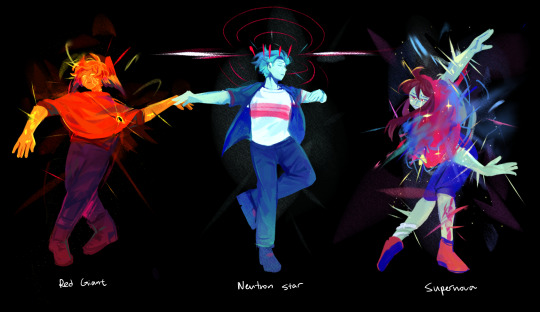
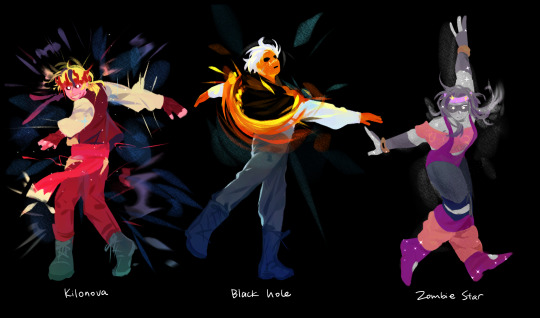
Stellar death
#dddaily4sherin#day 313 i totally did not mess up the day count yesterday#life series#grian#scott smajor#pearlescentmoon#inthelittlewood#goodtimeswithscar#zombiecleo#3rd life smp#last life smp#double life smp#limited life smp#real life smp#mcyt#trafficblr#traffic smp#my art#i had an epiphany after a certain astro class and have been losing it ever since#screw the solar system make them all (dying/dead) stars!!!!!! (and related events)#and I finally got to do it tdy LMASODAOS HOPE U GUYS LIKE THIS IM VERY HAPPY WITH IT >:D#also ppl who knows astronomy/astrophysics feel free to psychoanalyze the hell out of this. i had sm fun assigning them HEHEHE
9K notes
·
View notes
Text


bingqiu human/demon role reversal as requested by alliechickfics on twitter! for a modest donation to the listed organizations and individuals over at SVSSS Gotcha 4 Gaza, you too can get a prompt fulfilled in exchange.
#scum villain#svsss#bingqiu#luo binghe#shen yuan#shen qingqiu#mxtx#my art#blowing the dust off this account#the donation form is open until the 21st#i'll reblog a post abt the event that goes a little more in depth once this goes up#the idea for this au is that sy has been sealed in lbh's pendant for a Good While#up until ming fan steals/damages it and incidentally frees him#so ofc lbh is accused of housing a demon in the sect#what choice does he and sy have but to run tf out of there
4K notes
·
View notes
Text
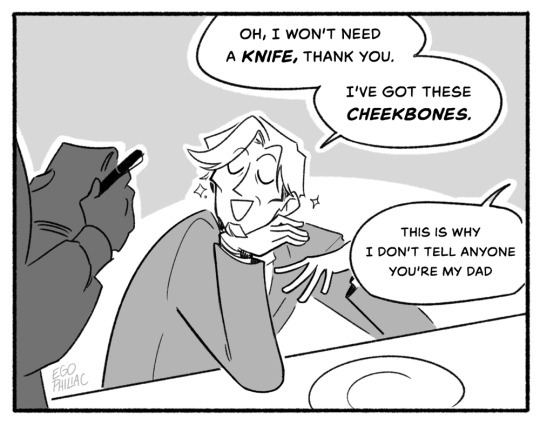


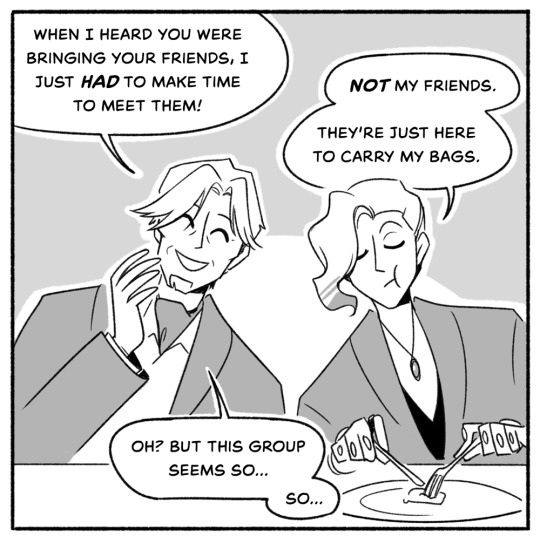

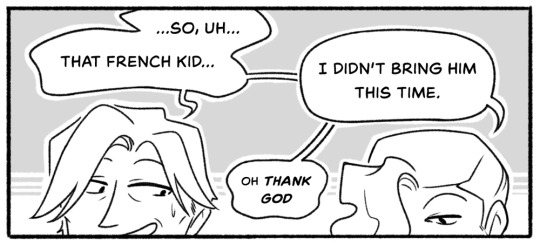
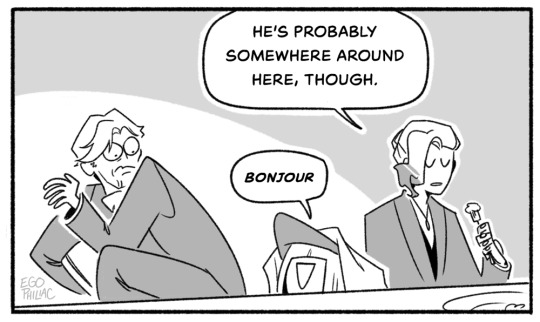
IT WAS ERIC AFTER ALL!!!! I'm so glad we got to meet him (before Vil snaps him away with those Infinity Gauntlets) (can't wait to see what happens when we get the matching Infinity Tiara to go with them, there will be no survivors)
(sorry to be so slow/rough lately, just got a lot of stuff on the ol' brain at the moment! alas, if only I could spend all my time drawing incredibly stupid characters I mean I do but)
#art#twisted wonderland#twisted wonderland spoilers#tapis rouge#i know these are not my best but by god i needed to draw ~daddo venue~#he is a treat! can't wait for him to yell at us for screwing up a shoot or whatever the last-minute disaster will be#i am SO HAPPY it turned out to be about movies after all! ...i mean sort of anyway#i'll take what i can get (and i do enjoy twst trying to be all cute about snow whAHEM i mean beautiful queen) (i see you there twst)#(also to be fair it actually wasn't poisoned in historial-revisionism-twstland so i think we can trust this apple. a+ acting eric)#anyway we are still. very solidly in the 'stand around and talk about the wallpaper for three hours' part of the event.#but HEY we got to meet eric! i was not really expecting it to be him so i am VERY pleased#also god help me i did think the shopping montage as portrayed by a rhythmic where they literally SKIP down the street was hilarious#there's a lot of Choices that were made in this event and that was a good one
4K notes
·
View notes
Text
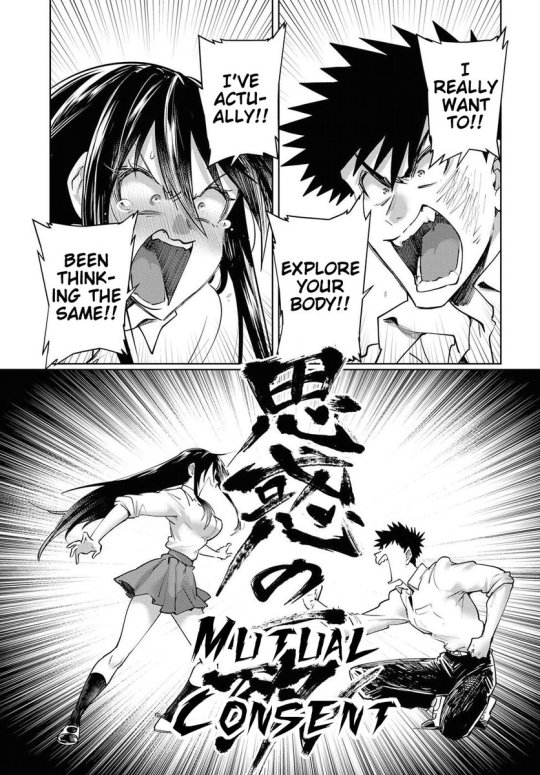
Please someone redraw this with Dr. Ratio and Aventurine because this is the exact vibe they have in my head post-Penacony.
#ratiorine#aventio#aventurine#dr. ratio#honkai star rail#hsr#not exactly#2.1 spoilers#but the vibe isn't present until then#this is canon I'm Hoyo#just trust me#I think my favorite thing about this ship#is that I went in expecting slap slap kiss#but came out of 2.1 convinced that these two could#in fact#get their shit together faster than virtually any other Hoyoverse pair#they're gonna be two years into their relationship before Seele manages to ask Bronya on a date#they're gonna be married before Renheng get their next ship tease#I just think they deserve to be those two guys who show up together#in the background of every promotion and event#and Hoyo never confirms anything#but you never see the one without the other#so everybody just KNOWS#LISTEN HOYO#I'm available for hire#you can pay me to print the money for you
7K notes
·
View notes
Text
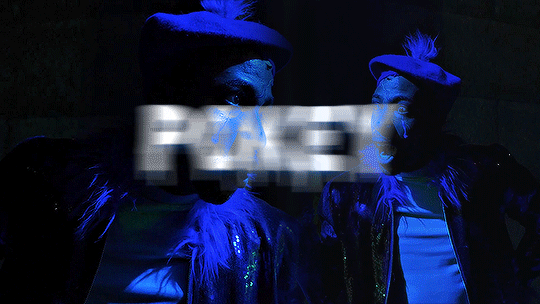
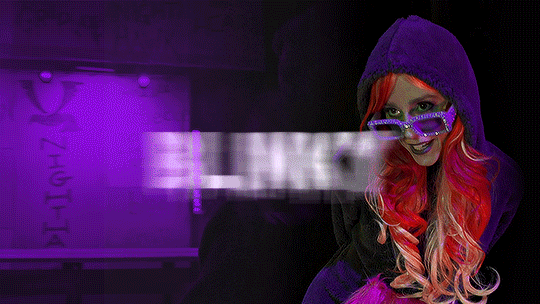
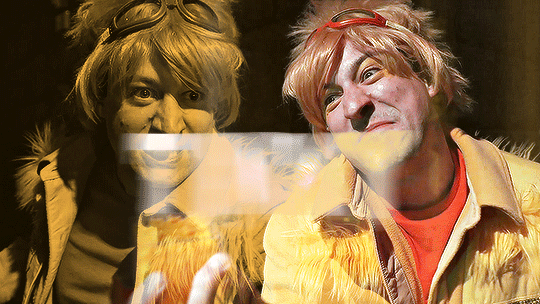

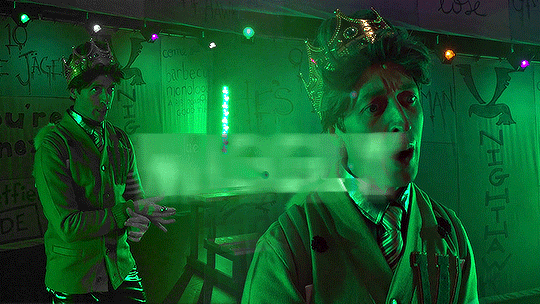
@pscentral event 20: antagonists
↳ THE LORDS IN BLACK in NERDY PRUDES MUST DIE
#nerdy prudes must die#npmd#starkid#npmdedit#team starkid#the lords in black#hatchetfield#hatchetverse#npmd spoilers#userisiah#userfaiths#userbaz#usercats#userhallie#noooo fucking clue what to tag in this fandom lmao#musicaledit#? sure#anyway yeah i watched npmd and immediately had to make this i was up until 1 am last night#wouldve been earlier but i had to take a break for dnd lol#i was gonna do a tua set for the event but this is easier and better so like. slay#i just wish they had more screen time. pokey and tinky have less than 20 seconds each </3#oh and the titles and stuff are from the fan wiki. hope i didn't get anything wrong#i've been getting a lot of use out of this motion blur text transition its so funky fresh#*edits
8K notes
·
View notes
Text

if art can be touched, will you let me hold you? | nanami kento

wc: 7.2k
summary: you press love into each piece of art you create, and nanami wonders if you’ve ever been loved that way.
contains: f!reader, non-curse!au, ceramic artist!reader, pov switching, slowburn, reader wears a skirt, food mentions, bad breakup (mentioned), mentions of art critiques, almost explicit sex, it’s love without words.
a/n: a concept and fic i didn’t expect would be so dear to me; there are some very small personal touches in this but the main inspiration for this is ‘we’ve been loving in silence’, but some bgm are ‘can’t take my eyes off you’, and ‘make you feel my love’.
ao3 (needs account)
MINORS DO NOT INTERACT.
part of the in's and out's new year/birthday event | request
prompt: showing ‘i love you’ in all the ways you aren’t used to

CLAY.
Take your material of choice; turn it over, get a feel of it. Is it a suitable medium for your art?
You first meet Nanami in the halls of an echoing applause.
The host’s spiel is muffled through the walls, but you know the program flow like the back of your hand—you’ve rehearsed your entrance every single day since being invited to announce your upcoming exhibit. In just a few minutes, your name will be called.
Yellow cue cards slip through your fingers, scattering to the floor as a result of the haste from your last minute touch-up just moments before.
“Shit,” you curse under your breath, checking the time.
As you crouch low, a pair of brown Derby shoes land in front of you—long and thick fingers reaching for your cue cards on the floor. The time on his wrist matches yours, each second highlighted in the stark contrast of a dark face and silver exterior.
You’re quick to receive his help, taking the cards into your hands as you lightly graze his fingertips. When you look up, you’re met with sharp lines—an angular jaw, eyebrows set straight; a pointed nose and his cheeks carving out hollow shadows.
A geometric study on blank canvas.
It’s embarrassing, the way you fluster and bow, thanking him with a stutter as you’re brought back to the urgency of the matter by the sound of your name being called out.
The rush to the conference hall has you breathing heavily, the nerves hitting you full force as you step up the stage, nearly tripping at the last step. Hues of blue, yellow, purple, and green lights glare at you, and when the host hands you the microphone, you chuckle nervously, clearing your throat before addressing everyone in the room to thank them for coming this afternoon.
Your exhibit is called ‘What is the Face of an (Un)Touched Soul?’—a collection of ceramic sculptures molded to the realism of a human face, with the soul imagined as varying patterns and colors that fit each featured individual.
It’s been half a year since you started, with three out of six sculptures completed already. Two are in-progress, and you have yet to find a subject for one more; there are six more months for you to complete everything.
The audience sounds their applause, sophisticated claps and nods a familiar tune in the many years of your sculpting career. Critics in the room jot down their thoughts, reporters holding up microphones and recording devices to cover your announcement.
You smile wide, the rehearsed kind.
And at the end of your presentation, stepping down the stage, you spot him again.
You think to approach him in that moment, to thank him properly instead of the fumbling mess you’d choked out in the hallway—but you’re pulled towards a crowd of reporters and critics, recording devices pushed just below your chin as you watch him disappear into a sea of faces not nearly as interesting as his.
.
You meet Nanami again in the bustling morning rush at the bakery near your studio.
The past few weeks have been head-down and tedious, late nights working on painting some of the last few pieces for your exhibit. One of them is of your niece, 5-years-old in mint and white innocence; your brushstrokes are featherlight, softly accentuated by sponge dabs—a slate barely filled in, with room for more colors to appear with time.
Another is of your neighbor, an old man whose eyes have seen war beyond your comprehension—a retired soldier, a veteran of the military force. He plants primroses by his windowsill, the pastel yellow a stark contrast to the life he’s lived in red; neither of the colors cancel each other out, neither of them blend. You drag harsh strokes against his jawbone while smoothly gliding watercolor across his eyelids.
The people in your sculptures have sparked an untapped curiosity within you—for stories, for lives, for souls and what those might look like.
You bump into Nanami on his way out, the sandwich in his hand falling to the ground as you frantically attempt to pick it up.
“Oh my god, I’m so sorry.” you turn over the sandwich, checking for any holes or openings in its packaging, “Let me–”
It only registers that it’s him when you notice the same brown Derby shoes, the same watch with that dark face and silver exterior, the same geometric perfection on his face when you look up and finally come eye-to-eye with that same fixed stare.
You clear your throat. Well, this is embarrassing.
“Let me buy you another sandwich.”
He doesn’t exactly look angry, expression set in straight lines, but you can’t tell for sure—there isn’t much you can go by.
“There’s no need,” he dusts off the wrapper, “it’s still sealed.”
“Please, I insist,” you pat down your skirt, linen rough on your fingertips, “As a thank you too, for last time.”
He arches a brow, and for a moment you worry that you’ve remembered him wrong—honey blonde hair and features you’ve been intrigued by since.
“You insist.” he repeats, clarifying more than questioning.
You nod.
He sighs, checking his watch before pocketing his sandwich and turning back to open the bakery doors.
The silence in line to the counter is awkward. Nanami remains impassive, hand tucked inside his pocket—you can’t read a single thing about him.
“I was meaning to thank you after the exhibit announcement,” you start, turning slightly to face him before looking ahead again.
He hums.
“But I couldn’t find you, so…”
He hums again.
The lack of response makes you nervous and quite honestly a bit irritated. Here you are, trying to be nice, and all you’re met with are dry—
“It’s no problem, but that’s thoughtful of you, thank you.” he finally says, “I didn’t expect you to remember.”
A pause.
“I’m sure you meet a lot of faces in your line of work.” he further clarifies, in case his earlier remark had offended you.
You snort, “I wish.”
The line moves forward.
“Ceramic faces, maybe. People not so much.”
When you glance at Nanami, the look he returns is still characteristically inscrutable, but you think the corners of his eyes soften just a bit—to feel for you maybe, you hope, you think.
The line moves quickly after that, and next thing you know it, you’re by the cashier, pointing at one sandwich for you and another for him. You buy him a cup of coffee too, just as an extra kind gesture (—for his time; you’re sure he has places to be and people to see), but he stops you.
“Coffee’s on me.” he pulls out his card.
“Oh,” you look up, surprised, “you don’t have to do that—”
“It’s only fair,” he nods as the cashier punches in the order, “now we’re even.”
You attempt to rebut, but find no room for argument in the unbending weight of his gaze.
An interesting man.
You watch him stand by the claiming booth, hand in the pocket of his khaki suit. Nothing about him feels cohesive, yet he makes it work. Artistically, from a sculpting standpoint, the sharp lines on his face would be an interesting challenge—but beautiful, nonetheless. A study of near-perfection, you think.
And it would seem obvious, that from the rigid cut of his jaw and the sharp edges of his cheekbones that he’d act just as pointed.
Except, he doesn’t—a stark contrast to how much of a gentleman he seems to be.
His blue shirt stands out when you’d assume he prefers subtlety, and it’s ridiculous, but that yellow cow print tie feels simultaneously out of place but so fitting.
He walks toward you with your coffee, sandwich resting on his forearm.
“Thank you, Mr.—” you smile sheepishly, “Sorry, I don’t think I got your name.”
“Nanami Kento.” the corners of his lips lift slightly.
“Mr. Nanami,” you repeat, introducing yourself right after.
“Thank you as well.” he adds on as you both walk towards the doors.
Something tells you this is a missed opportunity. Something tells you there’s more to learn about this interesting man and what lies beneath his straight-faced sincerity.
The chatter from the bakery is replaced by the city’s breaths—cars passing, dogs barking, footsteps on pavement rushing to get to their next destination. And you and Nanami stand by the entrance, neither knowing how to say bye.
“Do you come to this–”
“My studio is just by the corner, so–”
You quickly look at each other. Nanami bows his head slightly, hand gesturing for you to go first.
“Sorry, um,” you tuck your sandwich in the crook of your elbow, “yes, I come here pretty often. My studio is just around the corner, so I drop by for quick meals when I can. You?”
“It’s on the way to work most days.”
You nod, humming.
Another awkward pause.
“I hope you–”
“I should get–”
You look at each other again, a bit more amused this time. The slight wrinkling of his eyes is impossible to hide.
He gestures for you to go first again, but you shake your head, offering him instead.
“I hope the pieces for your exhibit are going well.”
“Thank you,” you smile, bowing your head slightly.
That ‘something’ in your brain speaks to you again.
“Actually,” you begin, “sorry if this is weird, please feel free to decline, but,” you shift your weight, “I have one last piece to do and I was wondering if I could ask you.”
Nanami looks taken aback for a moment, eyes wider than normal as he processes what you’d just said.
“Ask me… for an opinion?” he clarifies.
You mentally facepalm yourself—you really should have made yourself clearer.
“Sorry, no, I meant,” you take a deep breath, fingers fiddling with your skirt, “if you’d like to be the subject for it.”
The expression on his face is as indecipherable as ever.
.
.
.
MOLD.
Be familiar with your art, learn more of its intricacies. What will you shape it to be?
In the most unexpected play of events, Nanami says yes, but not without his hesitations.
You explain your process: the selection of a subject, an interview to get to know them better, then a few meetings at the studio to create the mold of facial features before coating it in plaster.
Never in his entire law career did Nanami ever think he would be into art, much more be chosen to be the subject for it. But he figures, if anyone were to get him to do things so wholly out of character like this, it would be you.
After all, he’s been a fan of your works for a while—from your third exhibit up to your seventh one now.
People love paintings and the strokes on canvas, admiring textures and blends of colors bleeding into one another; Nanami loves sculptures, a mixture of materials and techniques forming an object with more than one viewing plane.
“Have you always loved sculpting?” he asks, sitting still on the wooden stool in your studio.
A few meetings have gone by by now, and he’s told you a few things about himself for this to be a comfortable enough way to spend his Friday night: he’s a lawyer in a firm he’s co-founded with a good friend, evenings being the only free time in his schedule; he lives alone in a two-bedroom apartment and his neighbor’s cat often lands on his balcony every morning; he likes coffee and tea, paperback books and music from the 30’s and 60’s.
He chose to be a lawyer to correct the shitty system that’s vowed to help but has instead made it difficult for anyone genuinely trying to be good.
“I started with paper craft first,” you mold out the slope of his nose, looking back and forth between him and the mass of clay on your desk, “you know that 3D looking paper art that kinda pops out of the page?”
He hums instead, careful of any slight movement that may disrupt the pose you’re trying to replicate.
“And this?”
Your metal scraper drags on the sides of the sculpture’s nose, sharpening it as it narrows to the bridge.
“I picked it up in college, was an outlet to keep me company during that time.”
The PR answer.
Nanami knows most of your general story; pamphlets and exhibits always give a run-down of the artists’ individual histories. You’d started sculpting as soon as you entered college, a need for company while in a completely unfamiliar place with no more home to return to. It was all or nothing, and as the sculptures grew in number, so did your popularity—you are by no means a fresh name to the scene 10 years later.
“Why do you love it?” he looks you in the eye.
You pause, holding his gaze for a few seconds before looking away, focusing on the chunk of wet clay between your fingertips as it turns more pliable.
“It’s gotten me through a lot.” you sigh, attaching the piece of clay to form his lips, “Touching clay feels therapeutic sometimes, and you can tell from how it looks if it’s been molded with love.”
The stillness in your studio is extra quiet, filled only with the faint sounds of your fingertips sticking onto clay; he doesn’t quite know what to say.
“Sorry, that was cheesy.” you scrunch your nose and pout.
He chuckles, a low laugh, “Not at all.”
You lock eyes, the curve of your lips upturned. He feels his eyes soften around its edges.
It makes sense, and he thinks he can understand; there must be a reason why he loves books with creased spines, why he prefers weathered pages—why the scratches on his vinyl records don’t bother him as much as it should.
.
You both like your coffee without milk, just with a bit of sugar for yours.
Nanami’s taken up baking, specifically breadmaking, in his spare time—he brings you sourdough the next Friday you meet.
Your studio is an organized mess, scraps of clay decorating the otherwise bare and white space. To the left of the room is a large cork board filled with pinned sketches and some color swatches—a visual representation of the creative chaos in your mind.
A whiteboard to its right holds your schedule, and everywhere across the room are your art pieces—on shelves, in glass cases. He assumes most of them are the versions that didn’t make it, considering that the ones that have are either auctioned off or left as collector’s pieces in exhibits and art museums.
“That’s the first one I ever made.” you sneak up behind him, biting off the sandwich you hastily put together.
The sculpture is smaller than the busts you’ve made for your current exhibit, but it still occupies a third of your shelf. It’s unlike any of the works you’ve ever done, but he supposes it makes sense, given how much your style has probably evolved over time.
The piece is a lot simpler in comparison to the edgy twists most of your works now contain, but the little girl fast asleep in the sculpture begs questions he’s not sure how to ask you—if he even should.
He continues to stare, clearing his throat; you eye him knowingly and snort.
“Just ask, I know you want to.”
The texture of the carved blanket catches his eyes, the ripples and creases made to conform to the girl’s curled up figure. There’s a sadness underlying her comfort, a search for security while being wrapped in a bundle of safety.
“Who is it?” he asks.
You pause before you answer; he’s worried he’s crossed a line.
“Me.” you admit, a near-whisper.
He hums, back still faced towards you. It explains, then, why he’s always felt an underlying sadness beneath the creases of your smiles.
When he turns his face to the side, an attempt to catch your eyes, you look away, diverting.
“Which one introduced you to me?” you gesture towards the rest of your pieces.
As it’s come to be, Nanami’s learned that you’re good at that too—creating curves of deflections, pockets where you can hide when you feel something’s gotten too close.
He plays along, turning around to view the expanse of your studio; it’s amazing, how the art pieces that stack shelf upon shelf all boil down to your hard work. You briefly mentioned that you haven’t taken a break from creating because you still don’t believe you deserve it.
“It’s not here,” he puts his hands in his pockets, “the one with the hand clutching a heart.”
‘Unhand’—his favorite piece of yours; he’d seen it in one of the museums he had to visit for one of his clients. Hyperrealistic branches of veins and arteries running across an anatomical heart, every curve and indent a carefully placed texture to bring your piece to life. It comes clenched in a hand, the veins streaming across each finger while blending into those of the heart’s—at first glance, it’s impossible to tell where one ends and the other starts.
It’s a different view from each angle—that’s why he likes it so much, along with the graphic nature of it. The pain feels vivid, real.
“Ah,” you run your fingers across your work table, fiddling with the small pieces of clay before taking a seat again, “that one.”
Nanami follows but he doesn’t say anything, resuming his place in front of you in the usual way he’s done the past few weeks.
“I didn’t think I was the type to be moved by art.” he confesses, sitting still as you continue the final work on the clay wisps of his hair.
You encourage him to go on, nodding along.
And he does, watching the way your steady hand forms features that look uncannily like him, if not better; strands of your hair always fall from behind your ears and he’s almost tempted to tuck it back to where it came from.
He tells you of the pain he feels from that piece, how it presents itself in different ways depending on the area you focus on—the constricted blood vessels, the buildup of pressure from a vein blocked by a thumb, the strain of muscles at the back of the hand.
A small smile makes its way onto your face, slightly sad but somehow relieved, “Didn’t expect you to be such a poet.”
“Must be from being around you so often,” he responds.
And if it’s a trick of the light, a part of him sinks at that possibility—he thinks your smile stretches wider, suppressed only by the shyness trying to hide it; no pain whatsoever.
Unexpectedly, you share with him the story. Not the filtered version, but the one just as raw and vivid as the sculpture made from it—a failed relationship that had you clinging onto sculpting as your lifeline. You spare him some of the gruesome details but hint at it enough that he can fill in the gaps on his own.
You tell him that you’re a people pleaser, you’ve learned—it’s the only way you can view that relationship with grace, that at least you understand yourself better because of it. That even when the grip on your heart wrung tight enough for each beat to hurt, you still clung on with all your worth.
(Now you know you shouldn’t have.)
People have come to you with stories of their own, sharing how much your art means to them. Critics write articles, both good and bad, detailing the technicalities of your work. The applause follows you everywhere you go, yet it has never touched you—has never gotten too close.
If your art has touched others, has listened and spoken their truth in your handiwork, who does that for you?
.
During one of the last few Friday meetings, you offer to teach him how to mold clay.
He looks at you curiously, watching the way your fingertips pinch and squeeze, how they glide to smoothen the material and press down to create indents on the surface.
“Do you want to try?” you ask, gaze still set on his sculpture in front of you. There’s a teasing edge to your tone, one that’s developed over the months of getting to know you more.
“Would that be troublesome?”
You laugh at his rigidness.
“Of course not.” you push your piece aside, standing up to gather clay from the mound of it to your right. You lay down a wooden platform for him–his own little workspace–and slam a chunk of clay atop it, “I think you might be good at it actually, since you like making bread.”
The movements are familiar but not entirely the same. He rolls up his sleeves, blue cotton pinching at the creases of his elbows; you hand him an apron to protect the rest of his clothing. There’s not much kneading involved, not much palm action too, but he learns to move his fingertips with a force he can only compare to creating little dimples into focaccia dough.
You teach him how to make a bread basket—something practical but beginner-friendly; something he can use and keep as a reminder of you.
The trickiest part of it is mimicking the rattan weavings, and you notice him struggling with it when his strips of clay begin to break.
A screech fills the room as you push back your chair, standing up to go behind him as he attempts to salvage his work.
“Here, let me–” you reach over his shoulders, flattening some of the cracks from above him.
You’ve never been this close before, the thin strands of hair dusting your arms tickling the sides of his ears. These past few months, he’s watched your hands press and pull and form, turning each detail of his face into art. It’s only now, right next to his larger and rougher ones that he’s noticing just how small and delicate yours are.
It’s dainty work, weaving and braiding. He attempts to do it again, but the clay only falls apart when he pulls too hard.
You stifle a giggle, the vibrations tickling his back, “We might take a while here.”
“I don’t mind.” he mumbles.
“You sure you don’t have anywhere else you’d rather be?” you lean forward, pressing closer until he feels your warmth against the back of his head, “I feel bad, I’ve been taking up most of your Friday nights already.”
It shouldn’t mean anything; he shouldn’t feel anything—you seem to be unfazed; art is meant to be taught by doing.
But then your hands go over his, guiding them to lift each strand of clay gently before interweaving them with one another, and he thinks—
—this must be what it feels to be touched by art.
So, no.
There’s no other place he’d rather be.
.
.
.
DRY.
Give it time, let it settle. Watch your art come into form. Is this a good foundation?
“Will you be free next weekend?”
His question surprises you as you stand in line at the bakery. You tend to catch each other at just the right times almost everyday, saving a spot for whoever’s running a little late.
Today, it’s you, rushing in slightly frazzled with your hair sticking out which way; you’d just finished up molding the sculpture late last night, letting it rest out to dry. Nanami’s head is turned towards you, hands in his pockets as he directs the same pointed gaze you’ve become all too accustomed to.
You must have forgotten to mention it.
“Oh,” you turn to him, “there’s no need, our sessions are over.”
His silence makes you nervous, just like it did the first (second) time you met.
Did you upset him? Did he already cancel plans to free up time for your studio?
The entire trip to the cashier is quiet, but you find that he’s ordered ahead for you—your sandwich order and a cup of your usual coffee. He pays for it too, despite your refusal (and confusion).
It’s when he hands over your drink by the corner of the room that he finally speaks.
“Not for a session.”
You tilt your head curiously.
The coffee feels warm on your hand, and you think you see the same warmth at the tips of his ears, dusting it light pink. He coughs, fingers clenching around his tie before loosening it.
“For a date.”
.
You begin to take up his weekends now, too.
Since that day at the bakery, when you’d nearly dropped your coffee before stuttering out your availability, you’ve already gone on seven dates (to you, at least; Nanami would officially count three).
He insists on still visiting you every Friday, bringing you dinner as a reminder that you should eat on time and not the moment you’re keeling over from a rumbling stomach and a pounding headache. You count these as dates too—because what else do you call spending time with someone you like while having night-long conversations over good food?
(Nanami creates a distinction though, prefers his dates to be more planned out and intended. On the three official dates you’ve gone on, he’s brought you to three different locations—a weekend market, a picnic by a lake after you’d mentioned something about it, and a vintage record shop on the outskirts of the city, a place he frequents often).
The near-perfection you once thought of the man, a geometric study on canvas—he’s still every bit of it, still every bit as interesting as what he seemed, just in a completely different way.
For a man typically so nonchalant, he is extremely particular about his tastes, borderline picky with trusted company.
Nanami enjoys coffee (as expected), but the fermented filter kind, dripped down a V60 pour over to extract different notes of sweetness and acidity. You’d think he enjoys a straight black, face stoic enough to handle its bitter bite; but no, his jaw clenches when he dislikes the taste, his tongue sounding the faintest click against the roof of his mouth before he downs the entire thing in one gulp.
He also happens to be extremely gentle, in a way you don’t expect from a man of his stature and build. Veins run through the back of his large hands, branching to webs around the thickness of his fingers; they may not be delicate enough to weave clay, but he carves out different patterns on the sourdough he presents to you every Friday.
The first time he held your hand, it wasn’t exactly planned—an instinctive move to reach out his palm as you climbed the steps of the spiral staircase in the record store out of town. You’d barely felt it then, just the featherlight hold of his thumb pressed against your knuckles as you gripped the fabric of your skirt.
(To your surprise, he kept it up all the way through, slipping his fingers through the gaps between yours as he showed you around vintage vinyls and the sound of love in muffled 60’s tunes.)
You imagine him to be like clay, a softness hardened over the years that have shaped him; smooth but solid to the touch, breaking into powdered shards once you manage to work your way through.
It’s unexpected, but you like that.
And you like him—quite a lot, really.
This date–the tenth, or fourth, whichever–is a lot fancier than all the others, a more formal dinner with a few glasses of delicious wine whose name you by god, don’t remember. You’d been too focused on something else—the handsome way he’d slicked back strands of his honeyed hair.
Black suits him, contrasting the paleness of his skin and complementing the sharpness of his features.
Black, the color of his suit, pressed neatly to fit him perfectly. He looks clean, broad shoulders with straight slacks falling to exactly where they’re supposed to be.
Black, which is the only thing you see, pressed up against him. You’re so close by your doorway, that half-minute of deciding whether to stay or walk away; he has one foot behind him and one firmly planted right next to yours.
You share a breath, fingers lightly intertwined with his.
There had been signs the entire night that it would lead to something like this—he’d played with your fingers a lot more, kept much closer to you than he ever has before.
Every sound around you is amplified—each inhale and exhale, the gulp he makes; your heart beats on rampage.
When you look up, your noses are almost touching, and his eyes are shut, the crease between his eyebrows deepening.
It’s a look you’ve only seen once before, when he’s stuck contemplating.
“Kento,” you whisper.
His eyes blink open slightly, the color of your coffee. He leans forward, forehead resting against yours as he takes a deep breath, “I–”
Then you kiss him.
It’s mostly a peck really, and wholly out of character for you, but it’s that same something that compelled you to ask him to model for your sculpture months ago that’s pushed you to do this right now.
You’re worried for that first split-second because he doesn’t move, shows no sign at all of reciprocating. It’s a moment before you consider parting that he finally softens, relaxing his lips as he glides them over yours. His fingers slot themselves by your ear, palm pressed against your jaw as he deepens it; you almost stumble back, his other hand catching your weight as it leans on your door.
It’s a good thing you did this then, because you learn that he likes you too—very much, actually.
.
Things are good a month until your exhibit.
Things are good until they aren’t.
You end up reading a premature critique on your exhibit, calling it ‘overrated’ and ‘boring’, detailing the trajectory of your decline as an artist, citing your works as having become increasingly more lackluster over the years.
The critic calls your theme ‘lazy’ and ‘unoriginal’, predicting your pieces to be nothing extraordinary or different from your older sculptures.
All this time, your publicist and manager have made it a point to protect you from things like this, requesting that you avoid searching up your name on social media or search engines. You’re usually fed with praises and the occasional constructive criticism, but never anything as spiteful as this.
It’s every possible thing that could be said to invalidate your hard work.
And you break because of it—along with Nanami’s sculpture.
It tips over accidentally, the funk in your mood making you especially clumsy.
The damage is terrible, half of his face is gone, his neck down still intact but chipped off. It’s impossible to repair without redoing the entire thing—which, you don’t have the time for, either.
You groan, banging your head against the table.
Frustration leaks out in your tears, every inch of self-doubt surfacing.
Nanami finds you in your studio that way.
He’d texted you the entire day, tried calling you a few times to no success. It’s a Thursday, but without your usual ‘just got home’ text, he’d gotten worried and rushed over as soon as his meeting ended.
If he’s being honest, you’ve been off this entire week—stressed and distant, overworked from revisiting all your finished sculptures for the exhibit in case of anything to change or tweak.
Then this.
And it’s too much—it’s all too much.
Nanami calls your name from your entryway and you look up with tears streaming down your face. He’s never seen you like this, you could never want him to.
He hurries over, brows immediately furrowed as he digs into his pocket for a handkerchief. The cow print would make you giggle on any other day, but now, he uses it to wipe your tears away.
“What happened?” his gaze shifts to your right, his sculpture half-ruined.
Silence.
“Is there anything I can do?” he asks hesitantly.
You shake your head, swiping at your nose, “It won’t look the same, Ken.”
“Do you want to redo it? I can clear up my schedule every–”
“There’s no time.”
Nanami takes your hands to rub his thumbs over your knuckles, soothing.
“Then we’ll do what we can.”
The sincerity in his voice hurts you, the reassurance in his eyes even moreso. You’ve never had anyone look at you this way.
“There’s no point.” your shoulders slump, lips trembling as another wave of tears pool on your lash line. “People are calling the exhibit a flop.”
“Who?”
You huff out, exhausted, “I don’t know, critics, media. Whoever.”
He furrows his brows, firm, “They don’t understand what you’re doing.”
You chuckle sarcastically, “They’re art critics, Ken, of course they–”
“If it means something to you, what does it matter to anyone else?”
That makes you look up.
Nanami stares at you with the same unwavering gaze, no longer indecipherable to you. There’s a softness in the squint of his eyes that you now know means concern, with every pointed feature only meant to drive his words home.
You’ve been second guessing everything down to the core of your abilities, because of what? A few words? This must be what you get for having a penchant to people please, for hinging on everything everyone has to say.
“If you love what you create, then continue to make it.” he squeezes your hands, as if pressing the words into your bones gently.
.
You remold and repair, and you build up your sculpture to something different but not worse than before.
You remold and repair to build up yourself.
The half that broke off isn’t as symmetrical as you’d like it to be—and it definitely doesn’t do justice to the man it’s sculpted of, but you think you like the softness you added to it, how his eyes look kinder. He means something else to you now, after all, compared to when you first started sculpting him.
And you think, you know just what kind of design speaks of his soul.
.
.
.
PAINT.
Add the final touches, perfect your piece. Bring it to life with colors and details, whether it be for one pair of eyes or many. Do you now see?
Nanami teaches you how to make bread on a Sunday morning.
Flour coats every surface of his counter, dustings of it transferred to the deep blue of his apron. You’re wearing a white one, borrowed from your studio. Elbow-to-elbow you knead, and he only has to teach you once for you to get the hang of it, really.
He smirks, “You’re a natural.”
“Must do stuff like this a lot in another life or something,” you stifle a giggle, playing along.
It’s a beautiful day out, golden sunlight hitting your cheek—Nanami stares, sneaks peeks between every knead. The same strands of hair tucked behind your ear fall to frame your face, and he hooks his pinky around it to tuck it right back (because he can now, without having to hesitate).
You turn to him, daylight in your eyes when you grin your thanks.
His kitchen has an open space, deep wood and black metal detailings as its central theme (the white bread bread basket you made together stands out on the counter, but he’s done that on purpose). There’s a pretty extensive collection of alcohol in his liquor cabinet, along with his very particular coffee set-up right next to his record player slotted in the corner.
On Sunday mornings, Nanami likes to keep his music playing; today, it’s the classic 60’s–’Can’t Take My Eyes Off You’–serving as your background beat, with the soft meows from the cat on his balcony as added accompaniment to the melody.
He watches you sway, his feet tapping along, then you jolt, giggling in surprise when there’s a hiccup in the song (it’s from the scratches on his record, but he can’t bother replacing it with a new one). After that breakdown in your studio, you’ve seemed to loosen up immensely.
“Ken,” you call him, “how much pressure do you usually put into kneading?”
There’s no way to explain it, really, but to make you feel it yourself.
“Let me–” he lets go of his dough, dusting his hands with more flour before coming up behind you.
Nanami is a big man, tall and lean, all chest and shoulders—when he hunches over you, you look so small, delicately tucked into him. Heat rushes to his cheeks, if you turn around you’d see pink; the music is drowned out by his heartbeat.
He leans forward, palms clasping over the back of your hands, fingers slotting themselves between the gaps of yours.
“Like this,” he pushes down, his chest pressed against your back. To get a better look at the dough, he tilts his head to the side, nearly slotting it by your shoulder, “Can you feel it?”
You hum, your swaying gone. He’s trying hard to focus on the bread, but when you turn your head to face him, the tip of your nose touching his cheek, he stops.
The moment is tense, drowned into silence despite the music playing in the background. He can hear your every breath.
“Thank you,” you whisper.
Nanami knows it’s for many things—for agreeing to the sculpture, for spending time on it; for this Sunday morning, for being there when you needed someone the most. But that’s not the whole point of this, he thinks. It’s how you sound, voice heartfelt and filled with something else—a kind of affection he’s all too familiar with himself.
This must be what you mean when you say you can tell if clay has been molded with love.
.
In the quiet, Nanami’s hands move loudly.
He holds you gently, just like he always has, but it’s a permission every time—like he’s asking if he can touch you, love you in ways you aren't used to.
Your apron falls to the floor, followed by your skirt, the fabric pooling by your feet. The faded gray t-shirt you wear during studio days is tugged over your head, dropped next to him. He takes his time with you, turning you over, feeling you, knowing you—thick fingers squeezing the sides of your arms lightly as his lips press against your neck.
A gasp escapes you.
Then you move, nimble hands undoing the buttons of his shirt, pushing it open as you feel across the planes of taut muscle on his stomach and chest.
He groans, soft and low, your fingers brushing against his skin, ticklish.
You take a step back and he moves along with you, letting you settle into yourself as you inch backwards, the back of your knees knocking against the edge of your bed. He holds your gaze as you move towards your headrest, your shy smile doing nothing to lessen the butterflies in his chest—you did mention that it’s been a while.
He kneels on your bed, the mattress dipping to accommodate his weight—his slacks have been discarded to the side as he crawls over you.
Beneath him, you look like the very subject art could only wish to replicate.
So, he makes sure to remember all of it—to look close and memorize every detail of you as he dips down, arm planted to the side of your head as his other hand cradles your face, tilting your jaw up for a kiss.
He catches your lower lip between his, running his tongue over it before sucking lightly. You moan, smooth and honey-sweet, bringing him closer with your fingers clasped behind his neck. The room is quiet save for your lips smacking against each other’s, warm and soft as the heat builds between you.
Slowly and tenderly, with the same care you tend to clay, Nanami discovers all your dips and curves; he kneads the flesh of your hips, gripping your thighs as he kisses his way down the slopes of your body.
You squirm in his hold, tugging at his hair when the sensation feels too much, too good.
(But when he reaches between your legs, arms locking your thighs over his shoulders, you realize, nothing could have ever prepared you for this, for him—he treats you as if you are every bit of the art you make, and looks at you like it too.)
Then, Nanami kisses you on the forehead when he’s inside you, lips pressing on the part of your skin that creases when your brow furrows.
A tear drips down your face.
“Should I–” he looks you in the eye, worried.
“No,” you breathe out, a watery smile as you nudge your nose against his chin, “keep going.”
So, he does; he loves you without the applause, with the feel of his hands, leaving no place untouched.
He moves his body against yours.
It’s only after, when he tucks himself into your neck, arms wrapped around you and skin sticking onto skin that you tell him your tears aren’t anything bad.
For the first time in a while, you feel full—perfectly content.
.
He thinks you should be the final piece to your exhibit.
It’s a grand event, the conference hall decked in some of your previous works; blankets of white cloth drape over the stage—the unveiling of all your sculptures. You’re standing to the side, looking pretty in a long white skirt while Nanami blends among the crowd, far back enough to remain hidden from reporters but close enough to catch your eyes should you look his way.
You present each one, introducing the titles with brief descriptions of the people they’re sculpted from. The reasons for your designs are left primarily up to interpretation, but you’ve explained it all to Nanami—he’s listened to every single one.
Then you present his sculpture, finding him through the crowd. The corner of your lips curl up slightly, the stage lights reflecting on your eyes.
He smiles at you the same.
‘The Undoing’ is what you call it—half-perfect and half-salvaged.
It’s far from your original vision for the piece, but you think you like this more, splitting down the part that’d originally broken off into two different colors. His entire color scheme consists of yellows, greens, and browns—the perfected side of his face appears in clean strokes of coffee, with light yellows highlighting his pointed features. The angles are clean and sharp, his gaze straight and dead-on.
Running down the cracks of the broken half is a sky blue line, an almost glowing effect added to the salvaged side. In a way, it’s an emergence, of the part of him you never thought existed—green wisps like leaves, a life springing from within. You add flecks of gold to mimic light bouncing off his irises the same way sand becomes a glittering sea of sunbeams.
To you, Nanami is warm but cold to the touch, and he’s undone you just as much, has chipped away at the parts of you that have built themselves over years of habits reinforced and untouched.
It is as much you as it is him.
That’s what happens when you love someone, he supposes—an intermingling of souls.
Kraft paper crinkles in his grip as he adjusts the bouquet of flowers behind him, deep red carnations and orange tulips decorated with white astilbe flowers—for when you get down, and he can have a moment with you privately.
Now, he looks at you fondly, shifting his feet from where he’s standing. You search for his face, eyes darting to where you know you’ll find him; he meets your gaze, and you smile brighter, that one look ringing louder than the standing roars of an echoing applause.

a/n: each segment represents the steps to making a sculpture that i tried to parallel with the development of their relationship. V60 pour over is a kind of set-up for drip/filter coffee.
thank you notes: for @mididoodles, this is my very late birthday gift for you midi, but i hope you like it! (this also so happens to be your request for my in's and out's event) 🥺 + @soumies @scarabrat for reading through the first third of this and believing in the vision for this when i was so unsure of it, i love you both 🥺 + @stellamancer for helping me figure out what goes in the 'contains' 😭 + @augustinewrites to scratch the nanami itch 🥺

comments, tags, and reblogs are greatly appreciated ♡
#nanami x reader#nanami kento x reader#kento nanami x reader#jjk x reader#jujutsu kaisen x reader#kento x reader#nanami x yn#nanami x y/n#nanami x you#nanami kento x yn#nanami kento x you#shotorus.writes#shotorus.events#in's and out's event
956 notes
·
View notes
Text
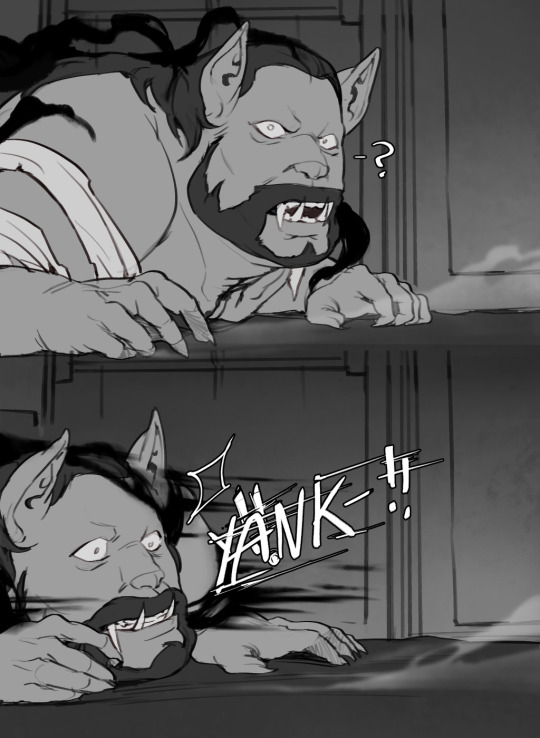



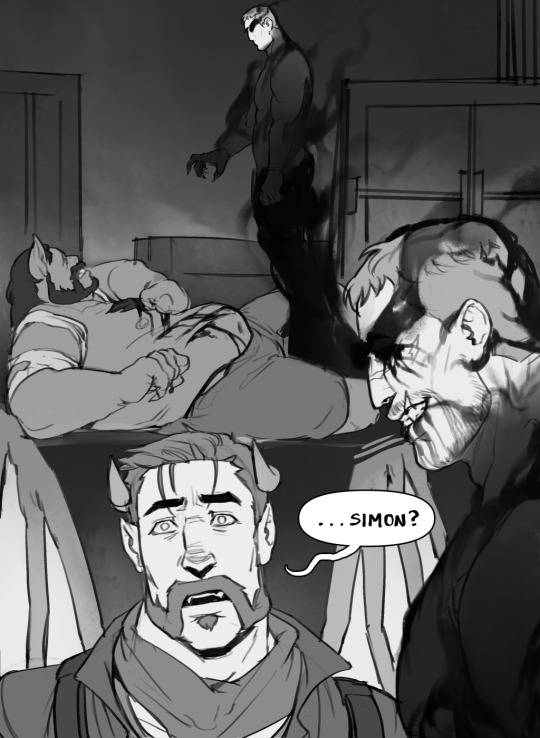
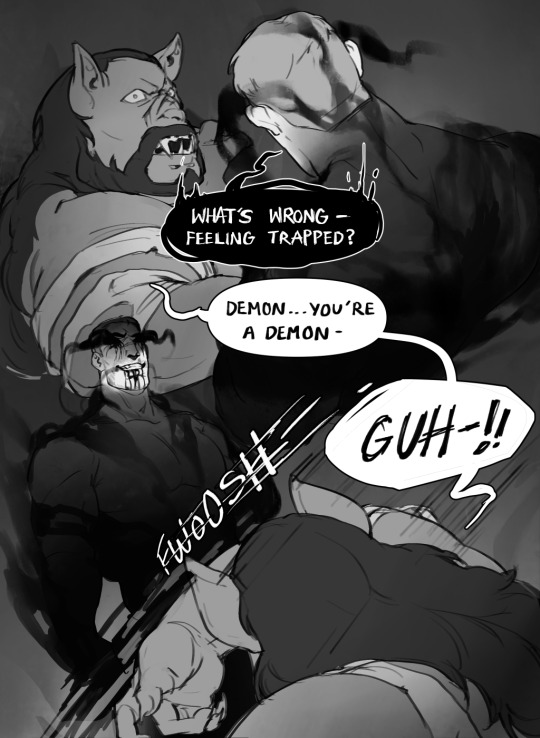
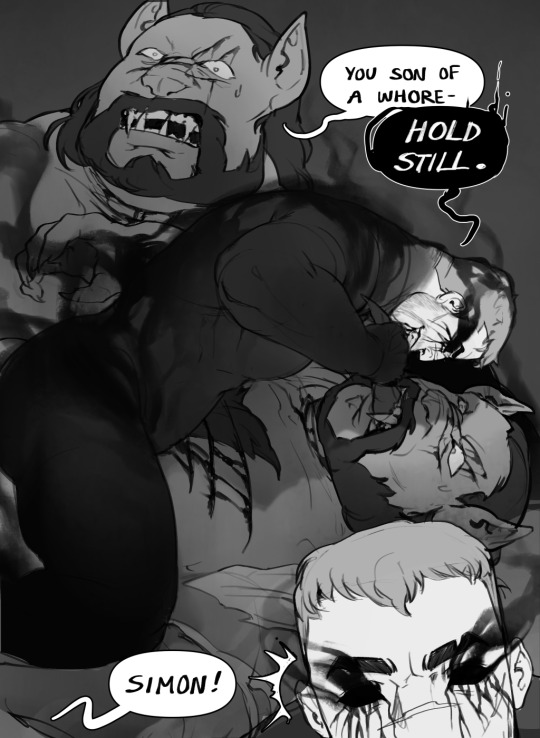
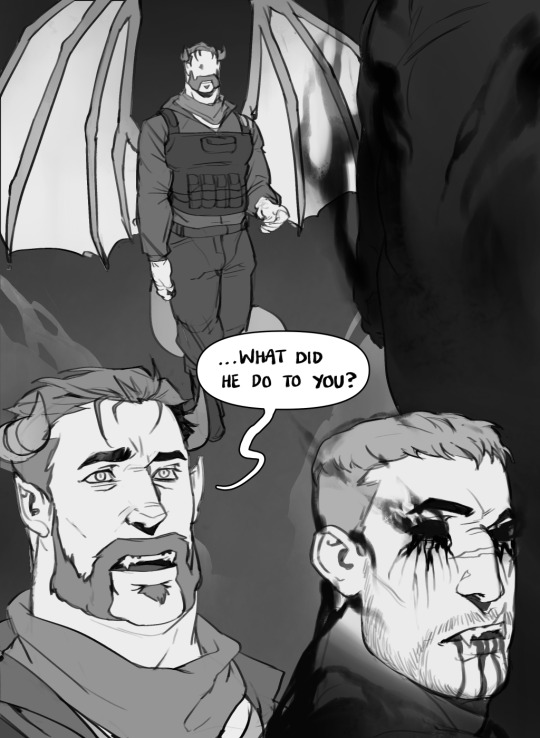
he keeps his promises.
early access + nsfw on patreon
#wraith!simon is extremely fixated on promises he'd made as a human e.g ripping out Roba's tongue and feeding it to him.#one notable feature about newly-born wraiths is that they obsess wholeheartedly over the events that led to their transformation#and use these as subconscious reference points in their search for revenge.#price has a general idea on how wraiths are made so. you can imagine what he's feeling right now#simon ghost riley#captain john price#monster 141 au#giragi art
4K notes
·
View notes
Text
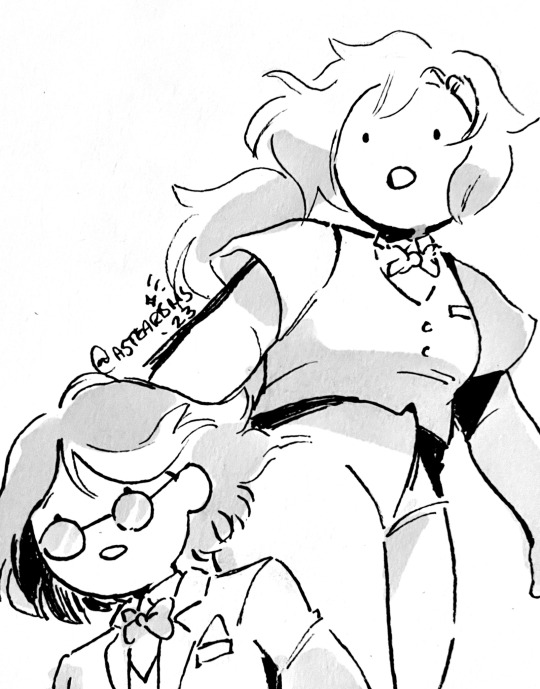
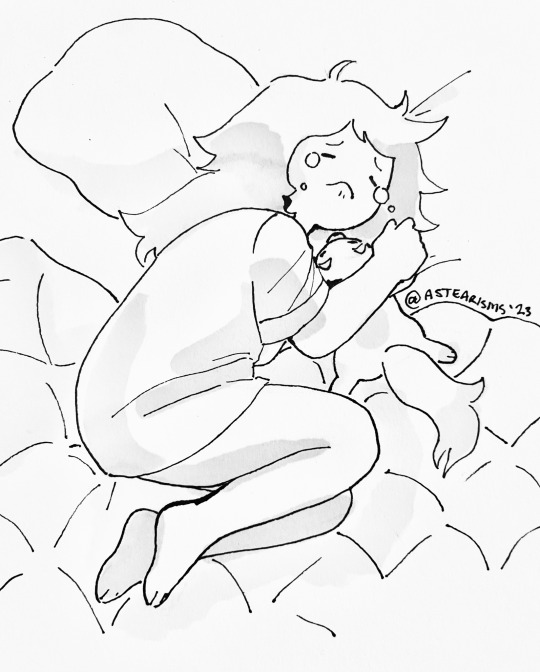
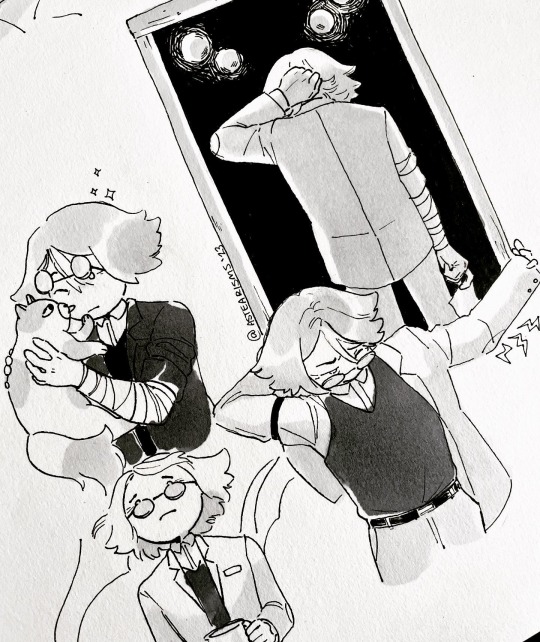
fionna and cake drawings before and after watching the episodes so far. it’s nostalgic and somehow cathartic and poignant and relatable and—it just started
#i’m part of the demographic where i was a kid when adventure time started and now watching fionna and cake as an adult makes me emotional#because did they keep us in mind when writing fionna and her attitude towards life#the dissatisfaction#the hoping for something more#something more magical than this dreary life filled with working to live and living to work#it’s so reflective of how life feels for me and perhaps many of us#and also Simon’s episode was so sad but so well thought out#exploring his feelings after the events of the adventure time finale is something I’m glad we get to see#there were already so many layers to his character in AT but now it feels like we get to dive deeper#I also felt emotional hearing Rebecca Sugar singing and writing a song that encapsulates his feelings so well#😭 it’s been awhile seeing her work exist alongside these characters#and all of these emotions get stronger because I remember AT being the one to inspire me to be a storyboard artist#when I was younger I used to follow many of the board artists here in tumblr and would get so inspired by them#to create simple but powerful boards that can capture the feelings of characters so well#Rebecca Sugar’s songs for the AT characters inspired me so much too#I’m sorry this is long I’m just feeling so many things experiencing all of this again as an adult#my art#fanart#adventure time#fionna and cake#fionna the human#cake the cat#simon petrikov
10K notes
·
View notes
Text
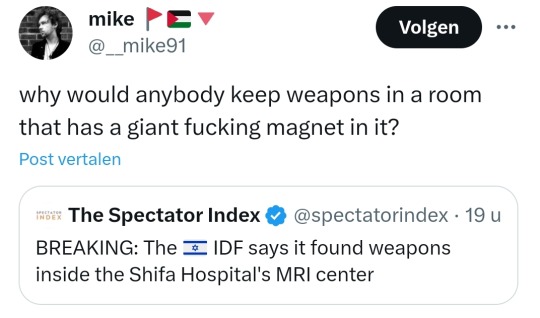
The IDF is counting on people to not have any critical thinking skills at this point
#like what a joke#they cant even do basic research#it doesnt take much to figure out how an mri works#cant make this shit up#current events#idf#israel#jerusalem#gaza#palestine#from the river to the sea palestine will be free#news#trending#twitter#viral#text post
6K notes
·
View notes
Text
i am so. not normal. about skizz saying that he didn't feel nervous before the Gamers Outreach charity event 2024 was starting. because he felt at home. like he said he still feels nervous in his day job even after 18 years of working there! But doing the charity event? he felt like he was home. like he was where he should be.
contrast that with impulse saying he was sweating to hell and back and preparing for every single way the event could go wrong
#imp and skizz#skizzleman#impulsesv#hermitcraft charity event#hermitcraft#skizz with the EMOTIONAL GUT PUNCHES!#bro get that man out his day job like rn#he needs OUTTTT GET HIM OUTTA THERE LET HIM MAKE CONTENT FULL TIME!!!!!#dose of impulse#dose of skizz
2K notes
·
View notes
Text
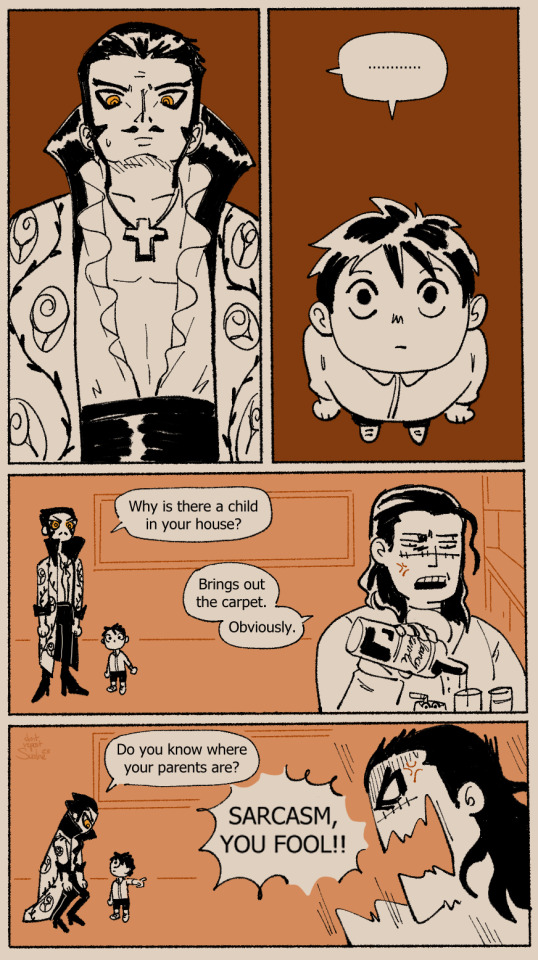

i imagine Mihawk doesn't know how to act around children.
(timeline)
#one piece#dracule mihawk#monkey d. luffy#crocodile one piece#crocodad au#my art#my comic#described in alt text#yeah huh. there's a whole plot happening now. once we reach The Event it'll turn more into a full blown story rather than funny seemingly#unjointed(??) comics. havent written them out yet but it'll be smth about 40 comics maybe and then some. this my life now.#there'll be 'keeping up with the strawhats' and world updates when we start getting to the plottening. im having a lot of fun with this!!
8K notes
·
View notes
Text
it took me 7 episodes to come to the full realization that #1 horse enthusiast Bdubs and #1 horse euthanasian Joel now exist on the same server and will for a multitude of time.
it might be nothing happens, but
#hermitcraft#hc s10#joel smallishbeans#bdubs#they are rotating#i am perfectly fine if nothing happens btw#it is more the cards are layed out and there is an Event that could take place#so it rotates
3K notes
·
View notes